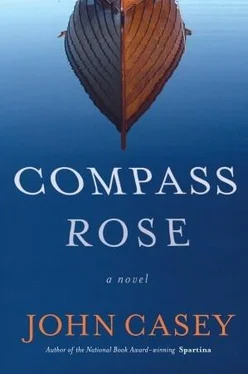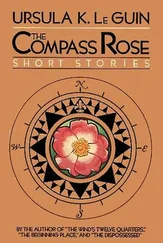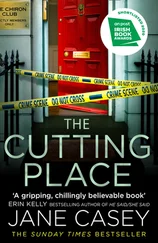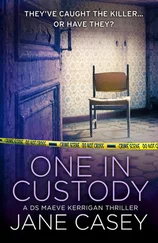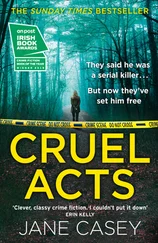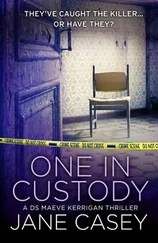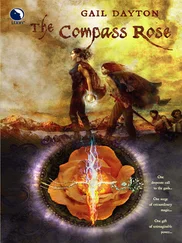“I wish I could give you a ride. It’s awful cold. I’m just afraid I couldn’t get back up the driveway.”
“I’ll warm up once I start walking.” May took a few steps and turned around. “Eddie could do your driveway. I know he’s got a couple of his boys out plowing. Or is he still shy about coming onto Miss Perry’s property?”
“No. I mean yes, he can come up the driveway. You’re right, I should call him.”
“If he’s out, you can talk to Phoebe Fitzgerald. She’s over at their office now. She gets on a CB and talks to him in his truck. No sense in your being stuck.”
Elsie watched her until she got past the first turn. It was the last part of the conversation — about Eddie — that lingered. What did it mean that May could just talk to her about the driveway, calm and neighborly? She took Rose inside. Rose began to fuss. Elsie touched her cheeks. They were very cold, probably hurt as they warmed up.
“I know, Rose, I know. It’ll get better in a minute.”
She heard her voice, saw her fingers unzipping Rose’s snowsuit. She slid Rose’s arms out of the sleeves, her feet out of the quilted booties and legs. She put Rose into the swing, but Rose fussed. Elsie picked her back up and walked her around the room. When she stopped moving, Rose fussed again. “What’s the story, Rose?” If she’d had a hand free, she would have smacked her forehead. “Oh, yeah. Bottle.”
They settled on the sofa while Rose sucked on her bottle. Elsie thought she should call Eddie. She should turn on a light. She should stand up and do something or she would sink. She couldn’t bring herself to the phone. The afternoon was nothing but heavy emptiness. It had taken her ten breaths to get to her feet when it was time to feed Rose. Once Rose was asleep, Elsie went to bed half undressed. Whatever there was to be done, whatever she felt, whatever facts there were — all equal. Nothing connected, anything connected.
Elsie woke up to a clanking and scraping. She went out in her bathrobe and boots. Eddie was plowing the driveway. It turned out Mary had called him. He was sorry to be making a racket this early, but he had to get over to Sawtooth, couldn’t fit the driveway in once he got going with his crew — cold as it was, he had to keep the boys moving.
Eddie’s good cheer would have weighed her down last evening. She’d barely been able to get Rose in her crib. Now she was hungry and cold but ready to do one thing at a time. She got Rose into the crib in Mary’s room without waking either of them. When she got to the Great Swamp office nobody wanted to go outdoors, so she volunteered to take a tour. She drove back home and got her touring skis.
She parked on the south side of Worden Pond, saw two ice-fishing huts near the north shore, almost a mile away. Halfway across, she wasn’t having fun. When the wind gusted it almost stopped her, sent cold air up the skirt of her jacket.
The fishermen had pulled their huts onto the ice with an all-terrain vehicle. The tracks came from the eastern shore, not from the Great Swamp Reservation, and they had their fishing licenses pinned on their hats. Elsie smelled whiskey, figured they were lacing their coffee. Nice old navy retirees, called her “Miss.” Not likely to freeze — they were as round as barrels in their orange snowmobile suits. She recognized one of them when he pulled back his hood to sip from his thermos. “Hello, chief. You the designated driver?” Her face was too stiff from cold to smile, so she added, “Hope you catch a mess of fish.”
She headed for shore toward the only high ground in the swamp, a drumlin just big enough to break the wind.
In a cove some wintering-over Canada geese and a couple of ducks had kept a small pool of water free of ice. She wondered again — was it instinct or did they figure out that paddling around kept the water from freezing? Did they take turns? When they flew in their vee, they took turns being the lead goose. They took turns at sentry duty when they were feeding — there was always one with his neck stretched up, swiveling like a periscope, while the others waddled around, beaks to the ground.
She got off the ice and shuffled along the lee side of the drumlin. She wasn’t getting much glide. If she came back in the tracks she made, she’d sail along. Fun later on.
She saw rabbit tracks, the paw prints close together on the wind-packed snow. Walking, pausing — nibbling the bush tops? Then the prints were suddenly farther apart, the forepaws overtaken by the hind feet pushing off together. The prints swerved left, then right. Then a hole in the snow. No more tracks. On either side of the shallow hole there were faint ridges — the marks of wing tips. A streak of blood on the broken crust. Owl? Hawk? Night? Day? She looked up the hill. A lot of scrub but some taller trees. An owl or hawk could perch up there, have a good view of the open ground — come down fast.
She touched the blood. It was frozen into beads — but that could have happened in less than an hour. The wind wasn’t fierce on this side of the hill, but it was still sweeping the loose powder along the crust, would have filled in the tracks if the kill had been last night. Most likely a hawk, though she’d seen owls hunt by day. One fall afternoon — her first year on the job — a great horned owl had followed her, hovering only twenty feet above her head. It had frightened her at first. With its wings at full spread and its face looking down, she saw it against the sky as flat as a painting; only the slightest movements kept it aloft. It didn’t come any closer, and she wondered more calmly what it was doing, began to admire its ease, even had a moment of fairy-tale giddiness — perhaps wild animals sensed her kindred spirit.
The owl had suddenly swooped into the knee-high grass a stone’s throw ahead of her. When it lumbered up into the air she saw it had a mouse in its talons. After a moment she realized that her walking through the grass had been stirring up whatever was hiding there — any creature that would have been better off staying still. The owl had been using her as its spaniel. So much for her as Saint Francis.
Then she’d wondered how the owl worked this out. Perhaps one time it had seen a fox or a stray dog trot across a field and noticed the scampering away of a field mouse, chipmunk, or rabbit, or the slithering of a garter snake. The owl had seen her disturbance long before she saw the owl.
After that she stopped thinking of herself as an unobserved observer. Any patch of ground was web upon web of awareness. Even if she was crouched in the bushes with her binoculars, invisible to other humans, she was giving off body heat sensed by ticks, odors that attracted deer flies. Even the littlest flash of color attracted something — a butterfly once landed on her cheek, perhaps mistaking her bright eyes and dark nostrils for what? Something in the iris family?
So she was sensed as well as sensing — but for a while she’d kept on thinking of herself as a central-exchange operator and a slow-but-sure decoder of everything. Then, as she read and thought about a hawk’s eyesight, a dog’s nose, a bat’s sonar (which certain moths could feel and then save themselves by folding their wings and plummeting), a goose’s migration (possibly navigated by the earth’s magnetic fields — the jury was still out on that) — she gave up.
She’d spent some time in anger and frustration at what she wouldn’t ever know. Then some time in a shriven state for having presumed too much. A little comeback — she knew more than most people. But even if true, so what? And at last an easier attitude. It wasn’t her job to know everything but to know enough to let some other people know enough to wonder. Be fierce enough to keep out the vandals. Encourage the teachable—“Be not afraid, the isle is full of noises, / Sounds and sweet airs, that give delight and hurt not.” At least if you’re higher on the food chain than a rabbit.
Читать дальше
